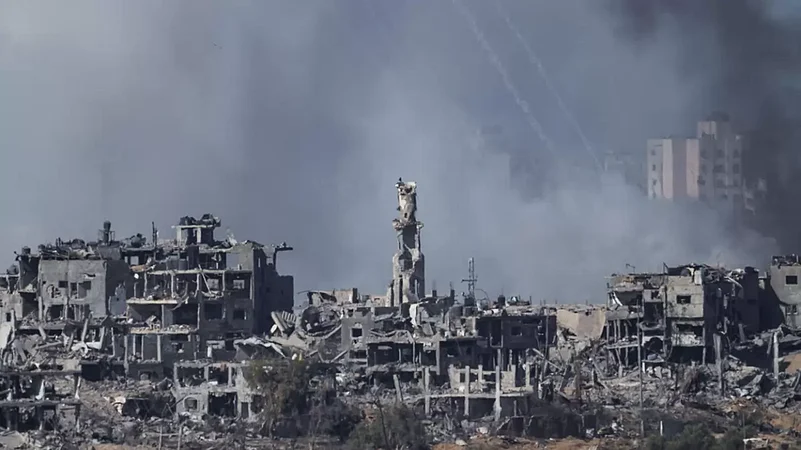When a WHO-led team Saturday entered the al Shifa hospital in the war-ravaged Gaza Strip, it called it a "death zone" with a mass grave at the entrance. "Signs of shelling and gunfire were evident. The team saw a mass grave at the entrance of the hospital and were told more than 80 people were buried there."
According to media reports coming out of Palestine, mass graves are everywhere in the region.
Abu Ammar who oversees the sacred duty of washing bodies according to Islamic rituals at the Al-Aqsa Martyrs Hospital in Deir el-Balah told reporters that in the past, the burial ritual involved careful washing with water, soap, and camphor, wrapped in three shrouds. But now, shortages of time and resources forced them to shroud the departed in a single cloth, hastily wiping away bloodstains from their faces.
Instead of the traditional sequence of bidding farewell at home, prayers at the mosque, and burial with individual headstones, the deceased are now quickly prayed over at the hospital grounds. Then, they are put into mass graves.
Doctors warn that improper burial and indiscriminate burial of corpses in mass graves may cause various diseases such as cholera, which may spread due to the presence of dead bodies near or in water supplies. The presence of dead bodies near or in water supplies is greatly concerning as this can lead to health problems such as diarrhoea and other illnesses because the bodies may leak faeces and contaminate water sources.
According to the Geneva-based independent organization, Euro-Med Monitor, a health disaster looms in the Gaza Strip, as dead bodies remain scattered in the streets and under the rubble of buildings destroyed by the Israeli aggression, which is in its seventh week now. The rights organisation pointed to the risk of diseases, such as cholera and disorders of the immune system, spreading throughout the Strip.
According to Euro-Med Monitor, Israel is systematically eradicating every aspect of life in the Gaza Strip and driving out its citizens with a barrage of weapons, and one such weapon is the accumulation of bodies in the streets and beneath building debris. These crimes are being committed in violation of international humanitarian law and with a flagrant disregard for the religious and cultural importance of respecting the dignity of the dead.
It is extremely painful to see the bodies of the dead, especially those of loved ones, children, and the elderly, and even more painful for people whose loved ones are trapped under the rubble and cannot be given a proper burial, Euro-Med Monitor said. The group called for immediate international intervention and support from relevant organisations to allow for specialised crews to retrieve the bodies and bury them properly and with dignity.
The humanitarian situation is dramatically deteriorating in the Gaza Strip due to the lack of access to water, electricity, and equipment needed to bury the bodies of the dead. This constitutes a dangerous threat to public health and the environment and may serve as a breeding ground for infectious and contagious diseases and skin and respiratory problems.
Euro-Med Monitor estimated that 4,150 people are missing beneath the debris of buildings hit by Israeli air and artillery strikes, with little hope of survival. Hundreds of additional bodies that cannot be recovered remain on the roads, particularly in areas where the Israeli army has conducted ground incursions.
The Gaza Strip lacks the basic services required to search for bodies under the rubble, said the Geneva-based rights group, whether due to the lack of heavy machinery and equipment needed by rescue and civil defence teams or the complete paralysis of ambulances and medical teams. Additionally, the power outage makes it challenging to place bodies in mortuaries, which results in improper burials.
The public decomposition of dead bodies for long periods of time leads to the transmission of serious diseases, including blood-borne viruses and tuberculosis. Gastrointestinal infections like cholera can also be easily spread, said Euro-Med Monitor, through direct contact with dead bodies leaking excrement, soiled clothing, or contaminated tools or vehicles.






















